Abstract
Studies have been carried out in human volunteer subjects to evaluate the role of aldosterone in the development, maintenance, and correction of metabolic alkalosis induced by selective depletion of hydrochloric acid. During the first phase of our study the rate of aldosterone secretion was measured before the induction of alkalosis (while the subjects were on a low salt diet) and again after a steady state of metabolic alkalosis had been established. The data demonstrate a fall in aldosterone secretion from a value of approximately 500 μg/day to a value of approximately 200 μg/day. Thus, it appears that an increased rate of aldosterone secretion is not a prerequisite to the elevation of the renal bicarbonate threshold.
During the second phase of our study, aldosterone was administered to the alkalotic subjects in doses of 1000 μg/day (or deoxycorticosterone acetate in doses of 40 mg/day) in order to determine the effects of a persistent steroid excess on the ability of sodium chloride to correct the acid-base disturbance. The data demonstrate that despite the administration of steroid, the ingestion of sodium chloride led to a reduction in plasma bicarbonate concentration from 39 to 29 mEq/liter, accompanied by a suppression of renal acid excretion. This reduction in plasma bicarbonate concentration occurred without a concomitant retention of potassium, a deficit of as much as 400-500 mEq of potassium persisting during repair of the acid-base disturbance. Our findings suggest that “saline-resistant” alkalosis, when it occurs in the absence of primary hyperadrenalism, cannot be attributed to aldosterone excess and/or potassium depletion of the magnitude seen in our study. We also suggest the need for a reappraisal of the way in which aldosterone excess contributes to the genesis and maintenance of alkalosis in primary aldosteronism.
Full text
PDF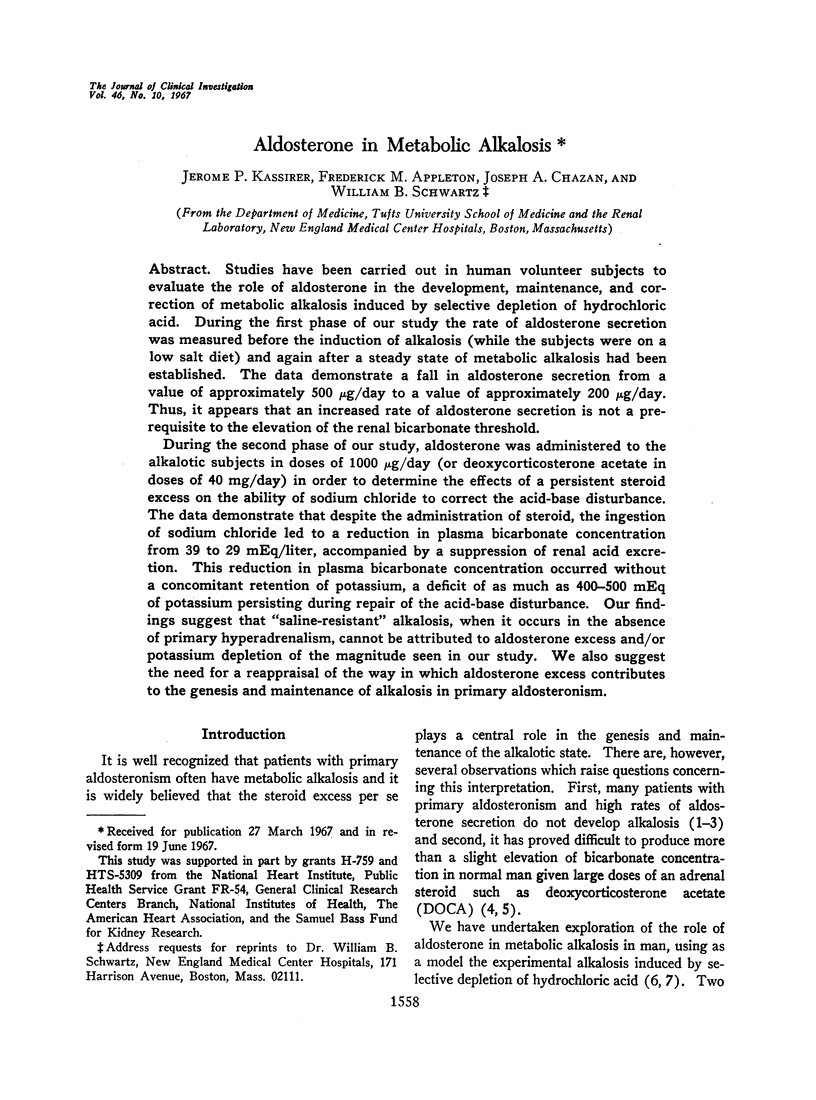
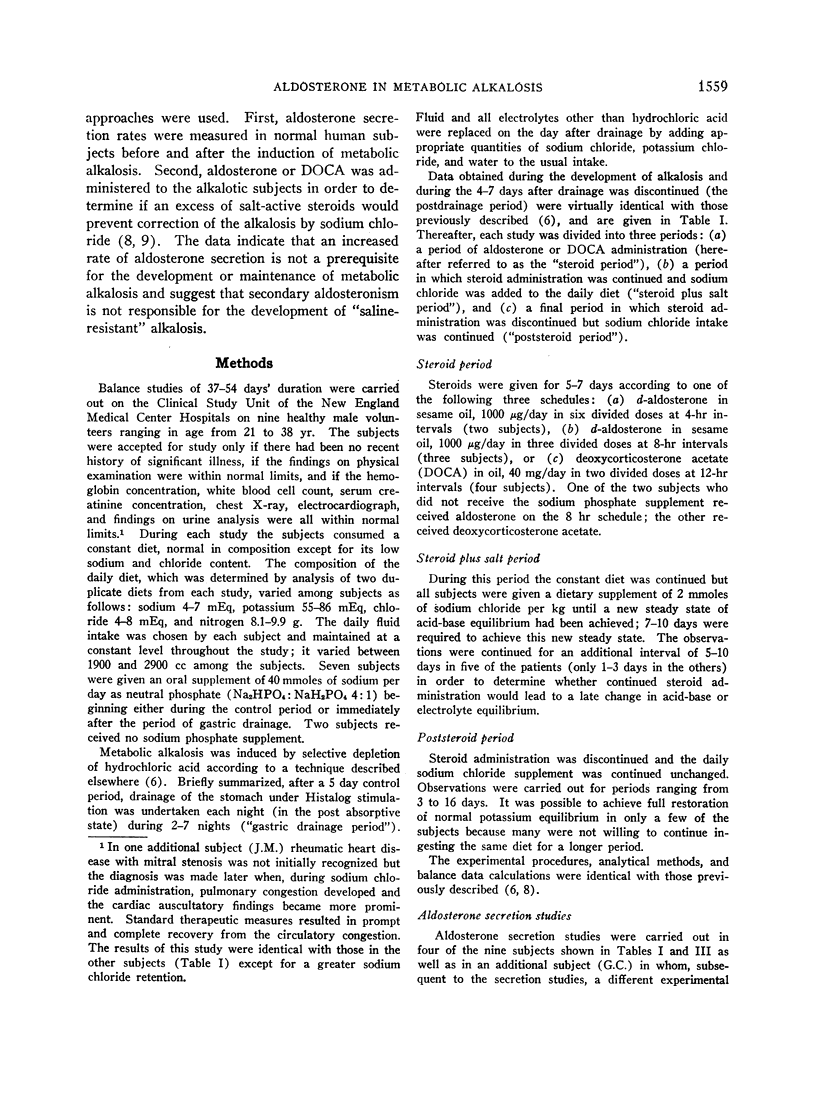

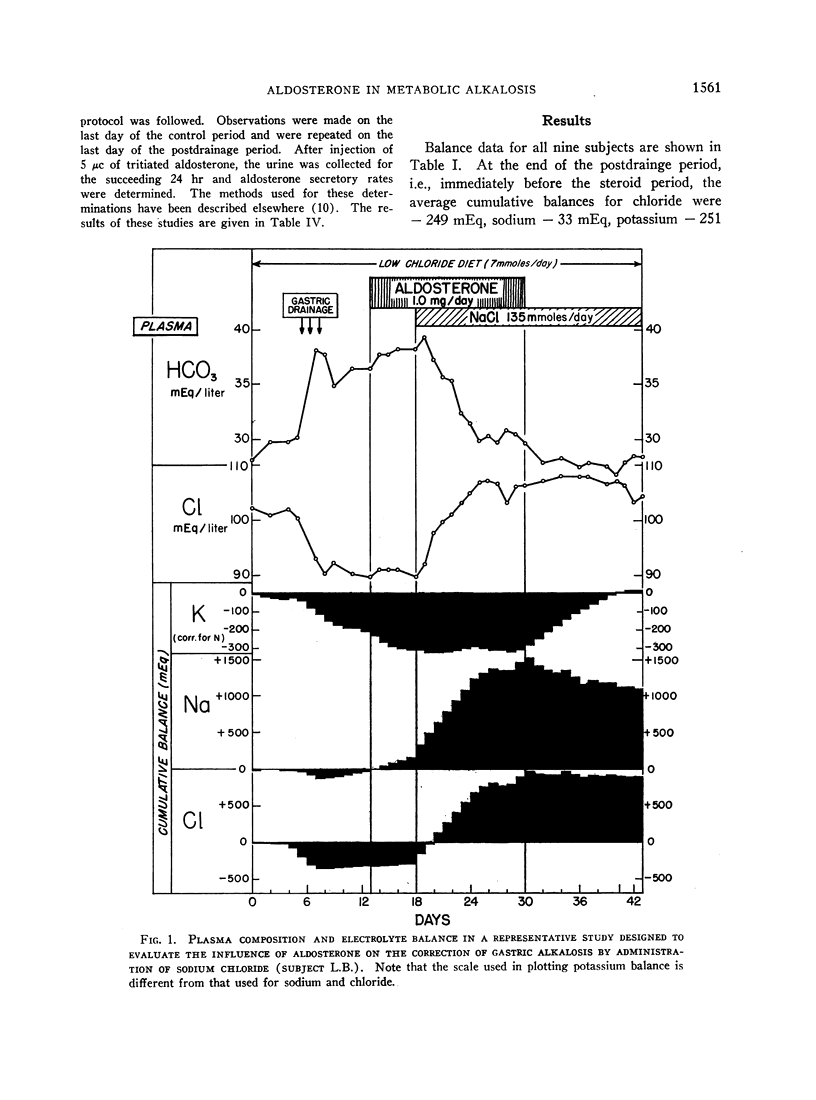
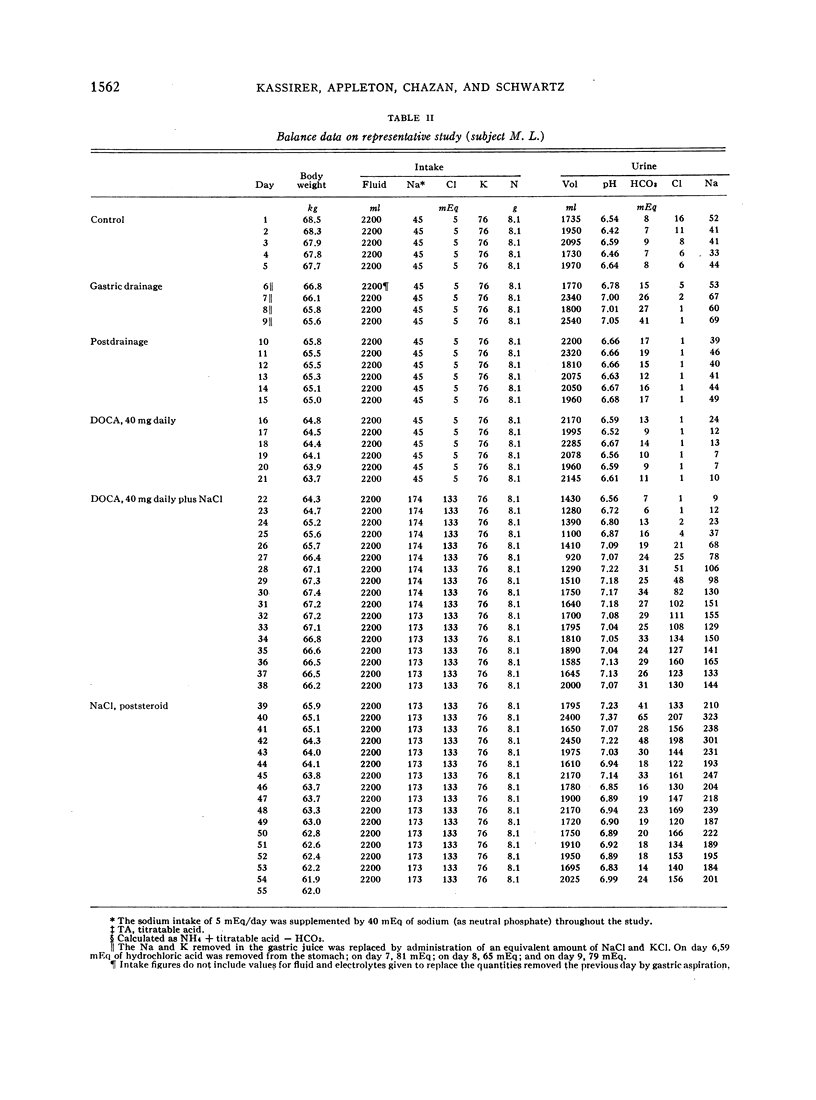

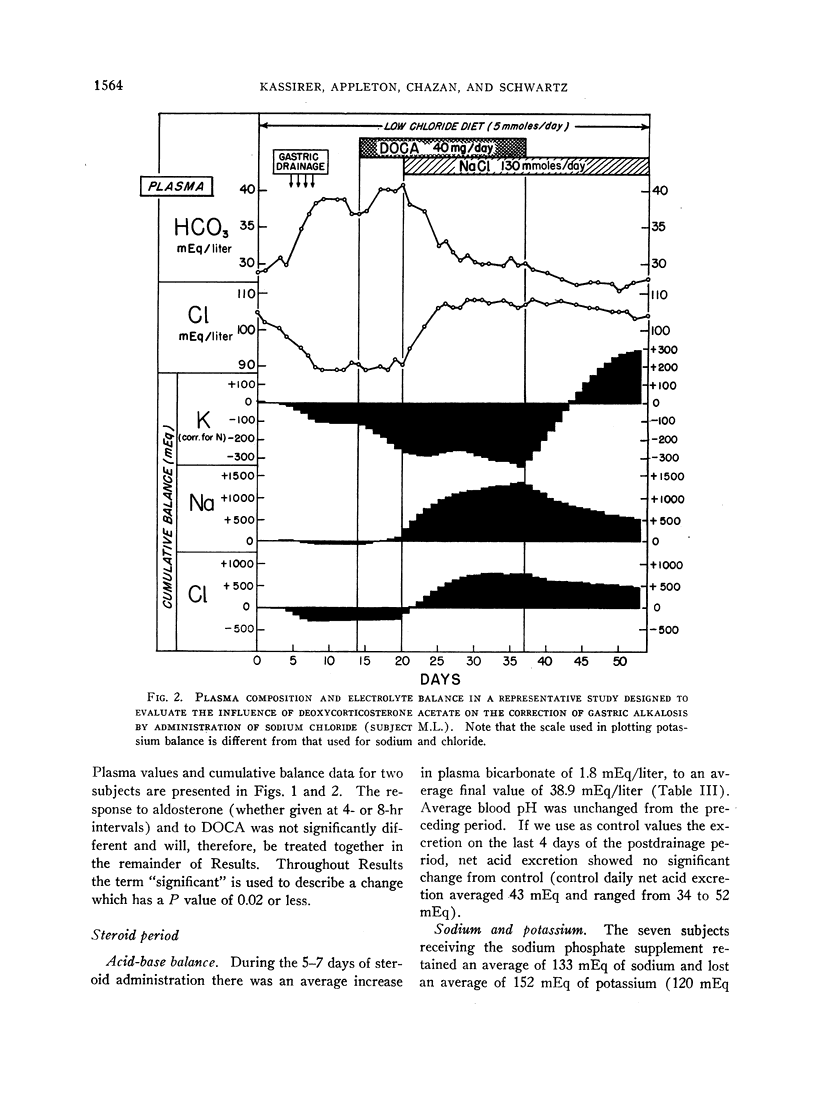
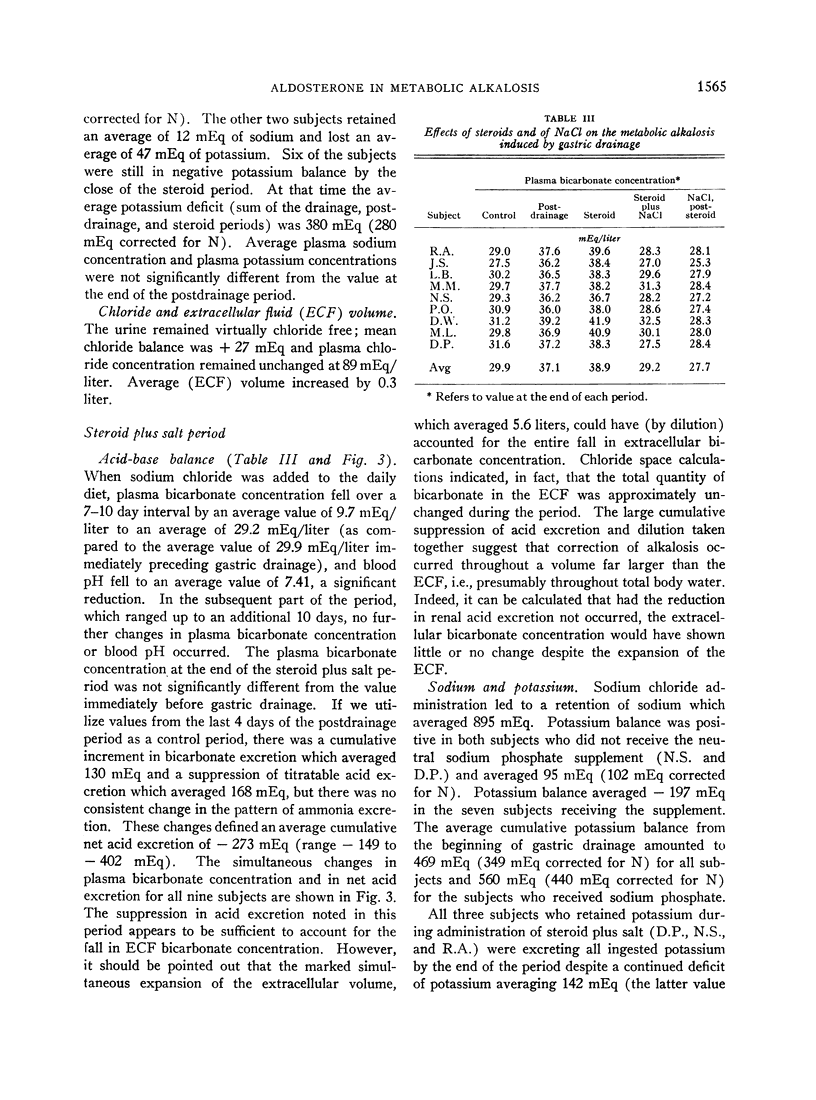
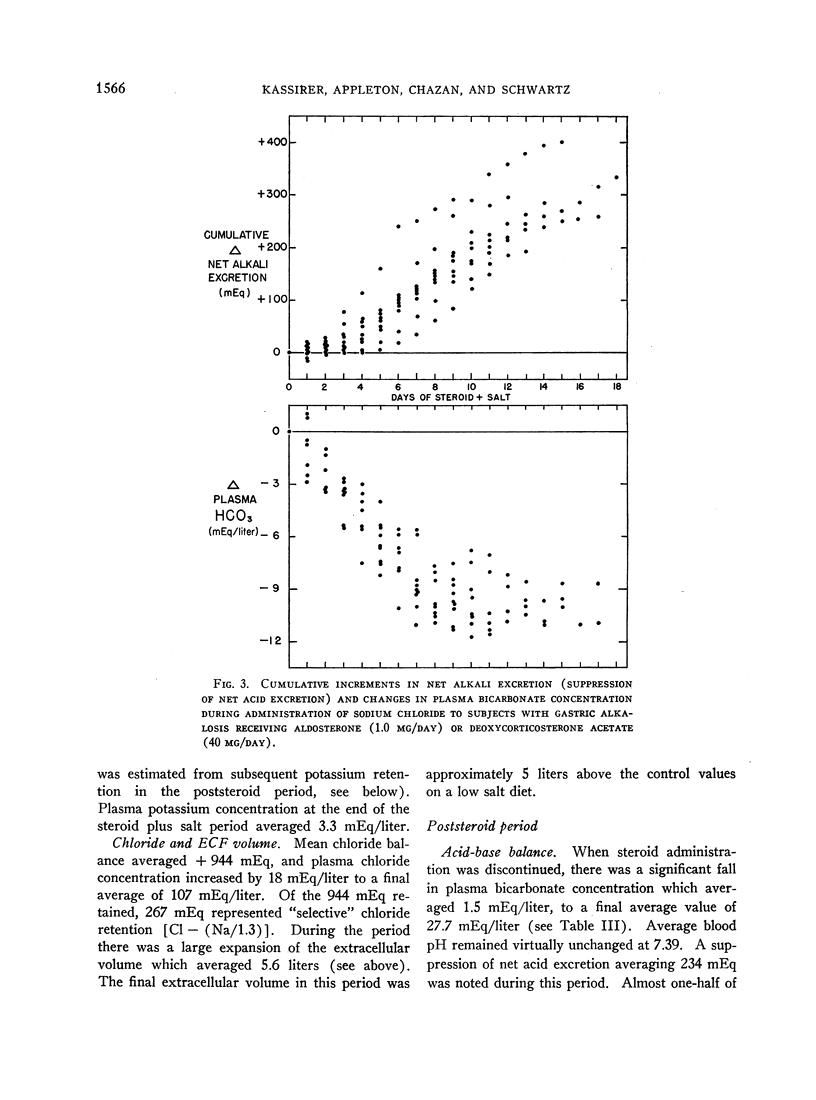

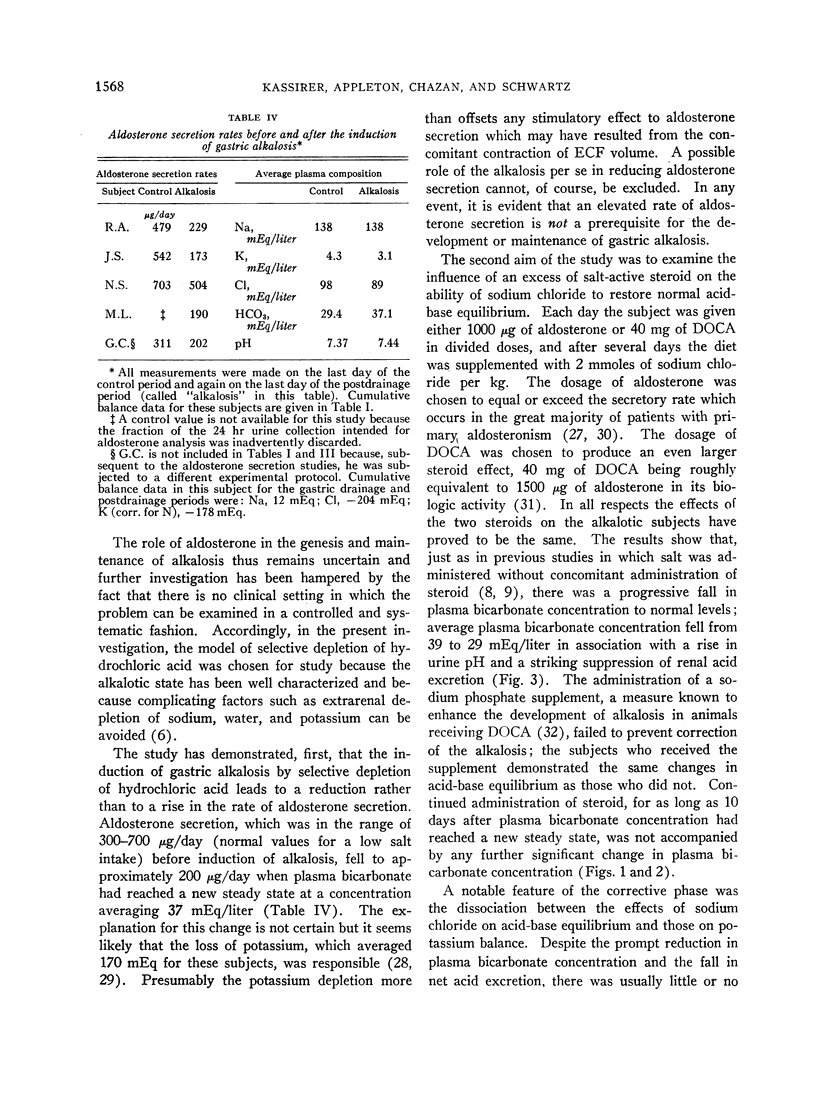

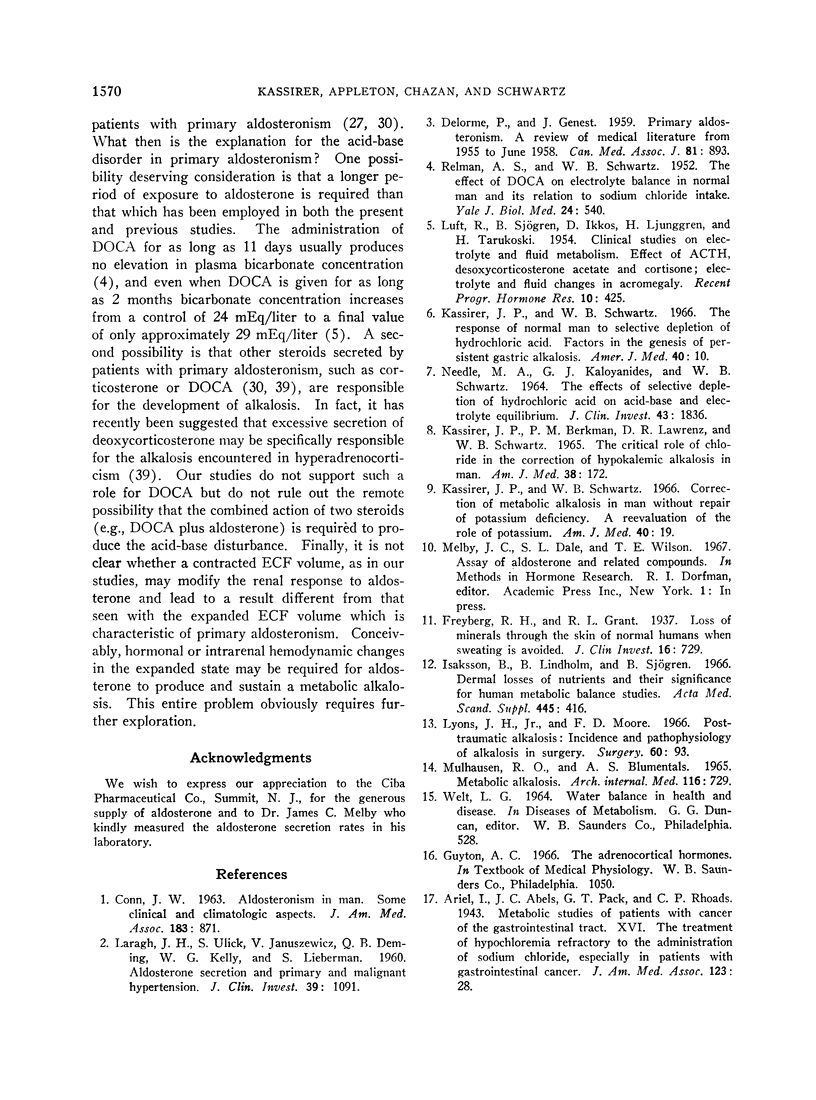

Selected References
These references are in PubMed. This may not be the complete list of references from this article.
- AMES R. P., BORKOWSKI A. J., SICINSKI A. M., LARAGH J. H. PROLONGED INFUSIONS OF ANGIOTENSIN II AND NOREPINEPHRINE AND BLOOD PRESSURE, ELECTROLYTE BALANCE, AND ALDOSTERONE AND CORTISOL SECRETION IN NORMAL MAN AND IN CIRRHOSIS WITH ASCITES. J Clin Invest. 1965 Jul;44:1171–1186. doi: 10.1172/JCI105224. [DOI] [PMC free article] [PubMed] [Google Scholar]
- ATKINS E. L., SCHWARTZ W. B. Factors governing correction of the alkalosis associated with potassium deficiency; the critical role of chloride in the recovery process. J Clin Invest. 1962 Feb;41:218–229. doi: 10.1172/JCI104473. [DOI] [PMC free article] [PubMed] [Google Scholar]
- BIGLIERI E. G., HANE S., SLATON P. E., Jr, FORSHAM P. H. In vivo and in vitro studies of adrenal secretions in Cushing's syndrome and primary aldosteronism. J Clin Invest. 1963 Apr;42:516–524. doi: 10.1172/JCI104740. [DOI] [PMC free article] [PubMed] [Google Scholar]
- BROCH O. J. Low potassium alkalosis with acid urine in ulcerative colitis. Scand J Clin Lab Invest. 1950;2(2):113–119. doi: 10.3109/00365515009051845. [DOI] [PubMed] [Google Scholar]
- CONN J. W. Aldosteronism in man. Some clinical and climatological aspects. II. JAMA. 1963 Mar 9;183:871–878. [PubMed] [Google Scholar]
- COPPAGE W. S., Jr, ISLAND D. P., COONER A. E., LIDDLE G. W. The metabolism of aldosterone in normal subjects and in patients with hepatic cirrhosis. J Clin Invest. 1962 Aug;41:1672–1680. doi: 10.1172/JCI104624. [DOI] [PMC free article] [PubMed] [Google Scholar]
- Crane M. G., Harris J. J. Desoxycorticosterone secretion rates in hyperadrenocorticism. J Clin Endocrinol Metab. 1966 Oct;26(10):1135–1143. doi: 10.1210/jcem-26-10-1135. [DOI] [PubMed] [Google Scholar]
- DANOWSKI T. S., AUSTIN A. C. Electrolyte and nitrogen balance studies in infants following cessation of vomiting. Pediatrics. 1950 Jan;5(1):57–67. [PubMed] [Google Scholar]
- DELORME P., GENEST J. Primary aldosteronism. A review of medical literature from 1955 to June 1958. Can Med Assoc J. 1959 Dec 1;81:893–902. [PMC free article] [PubMed] [Google Scholar]
- Darrow D. C., Schwartz R., Iannucci J. F., Coville F. THE RELATION OF SERUM BICARBONATE CONCENTRATION TO MUSCLE COMPOSITION. J Clin Invest. 1948 Mar;27(2):198–208. doi: 10.1172/JCI101934. [DOI] [PMC free article] [PubMed] [Google Scholar]
- Freyberg R. H., Grant R. L. LOSS OF MINERALS THROUGH THE SKIN OF NORMAL HUMANS WHEN SWEATING IS AVOIDED. J Clin Invest. 1937 Sep;16(5):729–731. doi: 10.1172/JCI100897. [DOI] [PMC free article] [PubMed] [Google Scholar]
- GANN D. S., DELEA C. S., GILL J. R., Jr, THOMAS J. P., BARTTER F. C. CONTROL OF ALDOSTERONE SECRETION BY CHANGE OF BODY POTASSIUM IN NORMAL MAN. Am J Physiol. 1964 Jul;207:104–108. doi: 10.1152/ajplegacy.1964.207.1.104. [DOI] [PubMed] [Google Scholar]
- GROLLMAN A. P., GAMBLE J. L., Jr Metabolic alkalosis, a specific effect of adrenocortical hormones. Am J Physiol. 1959 Jan;196(1):135–140. doi: 10.1152/ajplegacy.1958.196.1.135. [DOI] [PubMed] [Google Scholar]
- GULYASSY P. F., VAN YPERSELE DE STRIHOU C., SCHWARTZ W. B. On the mechanism of nitrate-induced alkalosis. The possible role of selective chloride depletion in acid-base regulation. J Clin Invest. 1962 Oct;41:1850–1862. doi: 10.1172/JCI104642. [DOI] [PMC free article] [PubMed] [Google Scholar]
- Isaksson B., Lindholm B., Sjögren B. Dermal losses of nutrients and their significance for human metabolic balance studies. Acta Med Scand Suppl. 1966;445:416–420. doi: 10.1111/j.0954-6820.1966.tb02393.x. [DOI] [PubMed] [Google Scholar]
- JOHNSON B. B., LIEBERMAN A. H., MULROW P. J. Aldosterone excretion in normal subjects depleted of sodium and potassium. J Clin Invest. 1957 Jun;36(6 Pt 1):757–766. doi: 10.1172/JCI103480. [DOI] [PMC free article] [PubMed] [Google Scholar]
- KASSIRER J. P., BERKMAN P. M., LAWRENZ D. R., SCHWARTZ W. B. THE CRITICAL ROLE OF CHLORIDE IN THE CORRECTION OF HYPOKALEMIC ALKALOSIS IN MAN. Am J Med. 1965 Feb;38:172–189. doi: 10.1016/0002-9343(65)90172-5. [DOI] [PubMed] [Google Scholar]
- Kassirer J. P., Schwartz W. B. Correction of metabolic alkalosis in man without repair of potassium deficiency. A re-evaluation of the role of potassium. Am J Med. 1966 Jan;40(1):19–26. doi: 10.1016/0002-9343(66)90183-5. [DOI] [PubMed] [Google Scholar]
- Kassirer J. P., Schwartz W. B. The response of normal man to selective depletion of hydrochloric acid. Factors in the genesis of persistent gastric alkalosis. Am J Med. 1966 Jan;40(1):10–18. doi: 10.1016/0002-9343(66)90182-3. [DOI] [PubMed] [Google Scholar]
- LARAGH J. H., ULICK S., JANUSZEWICZ V., DEMING Q. B., KELLY W. G., LIEBERMAN S. Aldosterone secretion and primary and malignant hypertension. J Clin Invest. 1960 Jul;39:1091–1106. doi: 10.1172/JCI104124. [DOI] [PMC free article] [PubMed] [Google Scholar]
- Mulhausen R. O., Blumentals A. S. Metabolic alkalosis. Arch Intern Med. 1965 Nov;116(5):729–738. doi: 10.1001/archinte.1965.03870050083012. [DOI] [PubMed] [Google Scholar]
- NEEDLE M. A., KALOYANIDES G. J., SCHWARTZ W. B. THE EFFECTS OF SELECTIVE DEPLETION OF HYDROCHLORIC ACID ON ACID-BASE AND ELECTROLYTE EQUILIBRIUM. J Clin Invest. 1964 Sep;43:1836–1846. doi: 10.1172/JCI105057. [DOI] [PMC free article] [PubMed] [Google Scholar]
- NELSON R. M., FIRESEN S. R., KREMEN A. J. Refractory alkalosis and the potassium ion in surgical patients. Surgery. 1950 Jan;27(1):26-40, illust. [PubMed] [Google Scholar]
- RELMAN A. S., SCHWARTZ W. B. The effect of DOCA on electrolyte balance in normal man and its relation to sodium chloride intake. Yale J Biol Med. 1952 Jun;24(6):540–558. [PMC free article] [PubMed] [Google Scholar]
- ROTH D. G., GAMBLE J. L., Jr DEOXYCORTICOSTERONE-INDUCED ALKALOSIS IN DOGS. Am J Physiol. 1965 Jan;208:90–93. doi: 10.1152/ajplegacy.1965.208.1.90. [DOI] [PubMed] [Google Scholar]
- SELDIN D. W., WELT L. G., CORT J. H. The role of sodium salts and adrenal steroids in the production of hypokalemic alkalosis. Yale J Biol Med. 1956 Dec;29(3):229–247. [PMC free article] [PubMed] [Google Scholar]


